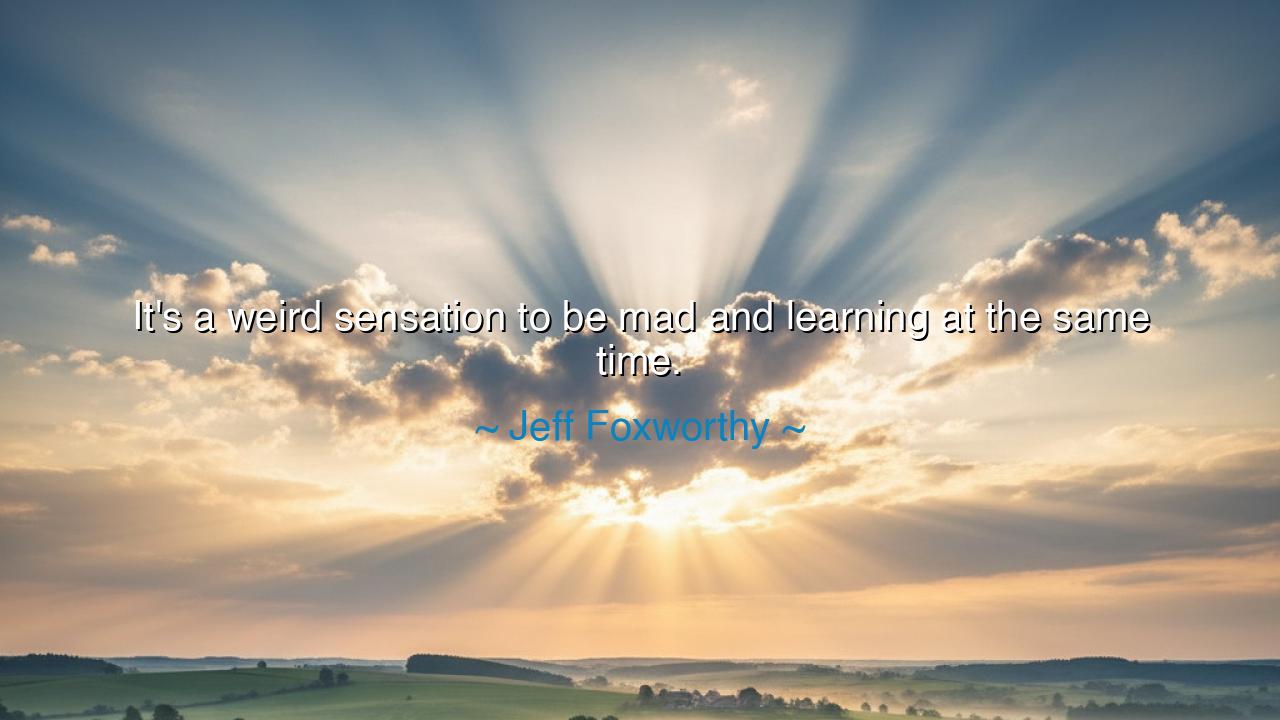
It's a weird sensation to be mad and learning at the same time.






When Jeff Foxworthy said, “It’s a weird sensation to be mad and learning at the same time,” he spoke a truth that lies deep within the human heart—a truth that scholars, warriors, and poets have all felt but few have named. For there is a peculiar fire in the soul when anger and understanding are born together. It is the storm and the sunrise in a single moment: one force destroying illusion, the other revealing truth. Foxworthy, though a humorist by trade, touched here upon a universal mystery—that wisdom often arrives through frustration, and that the moments which anger us most may, in time, become the very ones that transform us.
To be “mad and learning” is to stand at the threshold between pride and enlightenment. It is the instant when the mind resists correction, yet the heart cannot deny what it sees. The ancients would call this the “crucible of wisdom”—the heated place where the soul is tested and reshaped. In anger, we are raw, stripped of pretense; in learning, we are rebuilt. Thus, Foxworthy’s words are not mere jest, but reflection: he reminds us that growth rarely comes in comfort, and that anger is sometimes the midwife of understanding. The pain of being wrong can become the forge of being right.
Consider the story of Socrates and Alcibiades, the young Athenian general. Alcibiades, proud and brilliant, was often enraged by Socrates’ questions, which exposed his vanity and ignorance. Yet it was in those moments—when anger and humility warred within him—that he learned most. He confessed that though he wished to flee Socrates, he could not; for each rebuke, though it burned him, also purified his soul. Such is the paradox Foxworthy describes: the student’s fury is often the sign that the lesson has begun. Anger is the spark that lights awareness, if only one has the courage to let it burn without turning away.
In modern life, this “weird sensation” is familiar to all who have faced correction or failure. The craftsman whose hand slips, the student whose work is criticized, the leader whose plan collapses—each feels the sting of wounded pride. Yet within that sting hides revelation. The mind, awakened by anger, begins to see what it once ignored. Frustration, if endured with humility, becomes focus; defensiveness becomes discovery. The wise man, therefore, learns to listen even when his blood is hot, for he knows that truth often speaks most loudly in the heat of emotion.
There is a story of Thomas Edison, who after hundreds of failed attempts to create the light bulb, was asked if he felt anger or defeat. He smiled and said, “I have not failed—I’ve just found ten thousand ways that won’t work.” Surely he must have felt fury many times, yet he turned that fury into persistence. Each frustration taught him something new. He lived the essence of Foxworthy’s words: he was both mad and learning, and it was through that tension that invention was born. The flame of anger, when guided by purpose, becomes the lamp of discovery.
But the danger, as the ancients warned, is to let anger master the heart. For when anger blinds rather than reveals, it ceases to be a teacher and becomes a tyrant. The key is awareness—to feel the fire and yet remain watchful, to channel passion into thought rather than destruction. In this, the Stoic philosophers found their wisdom: “He who angers you conquers you,” they said, unless you turn that energy toward reflection. When the heart burns but the mind remains open, the soul grows strong, tempered like steel in the forge of truth.
Thus, let the teaching be passed down: when next you feel anger rise, pause and ask, “What is this moment trying to teach me?” For hidden in every irritation is a lesson, and in every wound, a chance to grow. The sensation of being mad and learning is strange because it is sacred—it is the meeting point of ignorance and awakening, pain and progress. To the fool, it is misery; to the wise, it is metamorphosis. So endure the discomfort of being both angry and aware. For in that tension, the soul is refined, and from that fire emerges the most powerful form of knowledge—the kind that changes not only the mind, but the man himself.






AAdministratorAdministrator
Welcome, honored guests. Please leave a comment, we will respond soon